In this post I want to talk about our experience in exhibiting Expand at the Tokyo Game Show 2014 and presenting at Sense of Wonder Night. Hopefully this post will give some insight to those who are thinking about exhibiting at TGS in future years.
If you’re just interested in viewing our SOWN presentation then you can view that here. The presentations starts at 4:02 and our presentation is towards the end at 5:57.
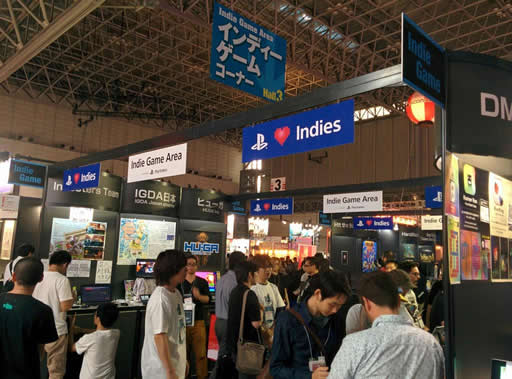
Image from Peter Traylor – Twitter
Background
Before diving too much into things it’s important to provide some context about our game and this year’s TGS. Firstly our game Expand is about 6 – 8 months away from release. It will be available on Windows, Mac and Linux. The game itself is a minimalist adventure game that uses circular space. It looks quite different and so is able to stand out a bit more in a crowd of games. You can find more information about the game on the Expand website.
Tokyo Game Show itself is an annual games convention that is held a bit out of Tokyo at Makuhari Messe in Chiba. TGS mostly focuses on Japanese games with a presence from companies such as Sony, Capcom, Konami and Microsoft. The big exception is Nintendo, they rarely if it all come to TGS. The event runs over four days with the first two days being reserved for business representatives and press with the last two days being open for the public. The business days attract over 20,000 people per day and public days attract around 100,000 people per day. Overall this year there were 251,832 people in attendance across all four days.
Sense of Wonder Night is an event that is held at TGS where developers of an experimental game are selected to present to an audience for 10 minutes. Everyone in the audience is equipped with a shaker that is used when they feel a sense of wonder. There are several awards handed out based on the judges feedback and the noise generated by the audience.
This year at TGS Sony decided to sponsor the Indie Games Area. All the exhibitors in this space didn’t have to pay for their booths. According to several websites the expected cost for a booth was $980 US for all four days and $318 US for just the public days. Every game selected for SOWN was offered a booth within the indie games area and all the other games went through a different selection process. Overall there were about 50 games selected. You can view a full list of exhibitors here.
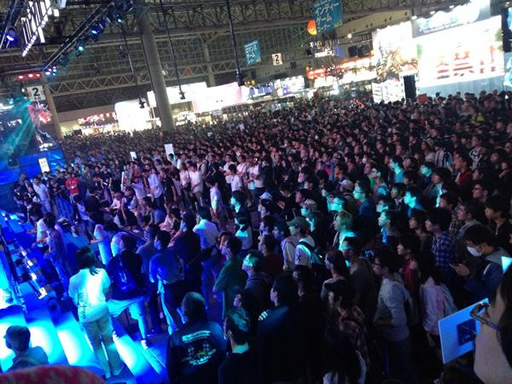
Image from Ayako – Twitter
General Thoughts
Firstly, the Indie Games Area was in a fantastic position at the show. The exhibition space at TGS extended over 8 large halls. We were located in the centre of Hall 3 which was also shared by Sony, Konami, Square Enix, Electronic Arts and Sega. We were spaced far enough away from those booths that they didn’t overshadow us. It was a bit of a statement to place us within such a prime position, especially considering that last year the indie games were located in a separate building away from the main exhibition halls.
It was impressive to see that Sony didn’t exploit or capitialise on their sponsorship involvement as you would expect most corporate giants to. They only displayed signs saying ‘Sony <3 Indies' above each of the booth clusters and handed out a free Sony branded t-shirt and water to the exhibitors. They didn't even show any form of favouritism to those indies that were already on PlayStation. Across from us was a well placed lounge area with bean bags and seats. It would have been so easy for Sony to erect TV's in the middle of this space promoting their own products but they didn't. Overall it felt like a genuine display of support to the indie community.
It's worth mentioning that it was still possible to buy booth space outside of the Indie Games Area. There may be an appeal for those that want to stand apart or create a more sophisticated booth. I spoke to someone who wasn't selected for the Indie Games Area but chose to buy booth space anyway. They felt that they were being overshadowed by the larger booths around them. My impression is that most peopled assumed that all the indie games were inside of the Indie Games Area and that was it. So I find it hard to recommend getting a booth outside that space.
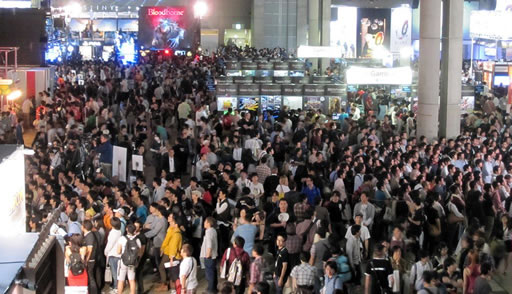
Image from Android Assault Cactus – Twitter
Secondly, we quickly realised that trying to quantify the benefit of going to an event such as TGS is really hard. This is something that a lot of developers struggle with especially when resources are tight. What exactly do you get for the investment? And is it worth it? To put this into context, the money we spent on TGS could have been used to fund another two months of development. When you’re running out of money that’s kind of a big deal.
For us, I think the investment was worth it for lots of different reasons. I’ll try to cover some of them here. My general feeling is that if you’re going to an event for just one of these reasons then you’ll probably come away being disappointed.
To start with showing your game and meeting lot’s of wonderful people is extremely motivating and is great for putting your head back into a healthy mental state. It can remind you that you’re doing great work and that some people out there do care about it. This is something that’s hard to get, especially if you’re working by yourself or in a small team. I lost count of the number of fantastic conversations I had with various people, some of which were responsible for introducing me to the first wave of ‘popular’ indie game developers. It’s amazing when someone you greatly respects tells you that your game was one of their favourites at the show. This feedback also helps you refine and improve your work as well.
Building networks and contacts is definitely beneficial as well. If I were to broadly define the types of contacts you make I’d probably list them as other developers, business contacts and press. If you’re going to an event like TGS then you definitely want to meet and chat with the other developers around you. Chances are you’ll learn something important from them that you hadn’t considered. The business days are the quieter periods of TGS and so this is the best time to meet other developers, especially if someone else is around to look around your booth. In terms of business contacts we met a lot of people who handle translation services and could assist us in bringing the game to Japan. In fact about 80% of the business people we met did just that. There were representatives from Sony and MS who seemed to be interested in getting a feel for the games being shown and what was standing out. Press were also present at the event and we were fortunate enough to do several interviews over the four days. Our impression is that a lot of the press swing by after they’ve covered the news from the bigger companies. On the first business day for example we had very few people come past from the press. However more came past on the following days. Unfortunately we weren’t at our booth for most of the second business day as we had to setup and present at SOWN. We suspect that we may have missed several press opportunities because of this. Generally speaking if you’re going to an event like TGS it is probably a good idea to familiarize yourself with the faces of journalists that are likely to be at the event. More than once I saw a journalists from the popular games press(Gamespot, Polygon, etc.) walk through the Indie Games Area and not be approached by any developers. You also want to do the marketing basics such as getting you pitch down and having a press kit pre-assembled.
There were several parties that were held after hours at TGS. We ended up going to the International/Indie/Business/Everything party and the Indie Stream Fest party. It’s definitely worth heading out to these despite being exhausted from showing your game all day. These events allow you to wind down and find out how the day has been for other people. I’d definitely recommend going to the Indie Stream Fest one. It was about 4000 yen to enter but it was a great environment, had plenty of food/booze and was well attended.
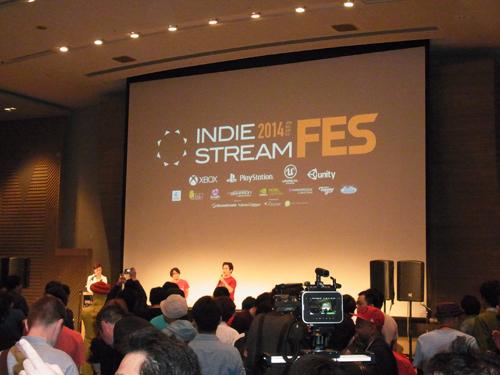
Image from Get News Feed – Twitter
Our Booth
We were provided with a basic shell for our booth, there was plenty of space to store our belongings underneath and room behind it to pin up an A1 sized poster. The diagrams we were provided suggested that the booths were made for only displaying one machine but we could comfortably fit two laptops on our table.
We decided to vary our booth on the business and public days. On the first business day only one of us with one machine had arrived in Japan, on the second business day we had to prepare for SOWN and for most of the day we could only have one person or nobody at the booth. We weren’t entirely comfortable leaving two laptop’s without security locks unattended at the event. We also needed the second laptop for our SOWN presentation. So we went for a simpler setup(pictured below on the left). Nothing was stolen from the booth, in fact I feel pretty confident that we could have left all of gear there without locks and nothing would be taken.
On the public days we setup two laptops(pictured below on the right). The crowds were five times larger on the public days and so we wanted to maximise our exposure and setup two machines.
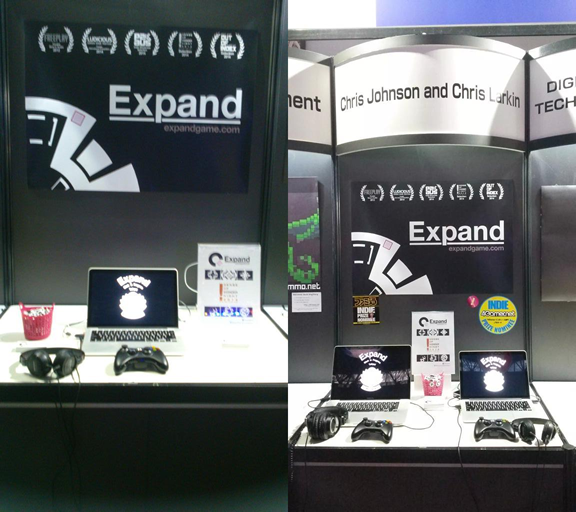
One thing that we did with our poster was to display several of the awards that Expand was nominated for. We did this because we wanted to provide a way for people to filter their selection of what to play such that it would portray the game favourably. There are 50+ games in the Indie Games Area, people are naturally going to filter the games based on some criteria so you need to stand out. Listing the awards also allows us to combat this idea that because the game looks ‘simple’ that it’s not worth people’s time.
On the first public day we were surprised to find two nominee awards from Famitsu Weekly and 4Gamer.net stuck onto our booths. It was a lovely surprise.
The Build
For TGS we didn’t create a custom build of Expand. We just had the entire work in progress game on display. It’s very time consuming to split off a separate build for an event. It also means that any impressions or feedback we get isn’t actually geared towards the final product but the demo. The game will be quite short when finished clocking in at around 2 hours and we have about 1 hour worth of content already complete. We let people play the game for as long as they liked and never kicked anyone off.
Here is a rough breakdown of how long people played the game. We aren’t using any metrics here, this is just from our observations.
- About 15% of people played the game for less than five minutes. They didn’t finish the introduction area.
- About 30% of people played the game for 5 – 10 minutes and finished the introduction area.
- About 45% of people played the game for 10 – 25 minutes and finished the first world.
- About 10% of people played the game for 25 minutes – 60 minutes and finished/attempted the second world
The build of the game is now pretty solid. I think we only ran into one game crashing bug and a few instances of smaller bugs than need be ironed out. We also had a chance to play test the newer levels in world two and the open world. Coming away from the show we definitely have a few changes we’d like to make. Namely they are:
- Reorder some of the areas in World 2 so that there is a more nature increase in difficulty.
- Improve the signalling used in World 2 and provide players with a longer window of opportunity to understand what the ‘puzzle’ element is to every level before being challenged.
- Restructure the open world so that it contains fewer branching paths as players would often get lost. Instead replace them with several interconnected hub areas. In short, more nodes and less arcs.
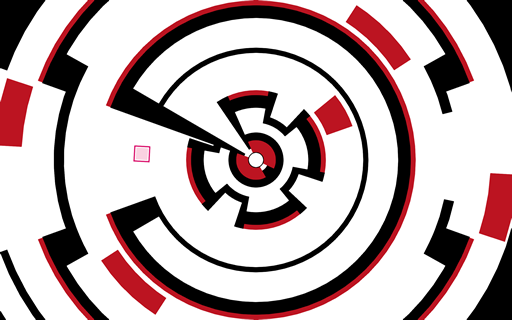
Sense of Wonder Night Presentation
I think our SOWN presentation went really well. It’s online for people to watch so you can be the judge of that. The setup and preparation for it was quite straightforward. We arrived earlier in the day and tested our equipment to make sure that it would work. We also met with a translator to check for any issues with the script that we had submitted a few days earlier.
In the end we decided to use a video for our presentation however I think doing a live demo would have been better. At some points in the presentation the video jumped too far ahead and had to be paused to keep in sync. This broke the flow and would have felt a bit jarring to the audience. It was just one of those unavoidable things that happened as a consequence of using video. With that said I think everything turned out reasonably well. The organisers were amazingly supportive and the event was just so much fun. My mouth become sore from smiling so hard.
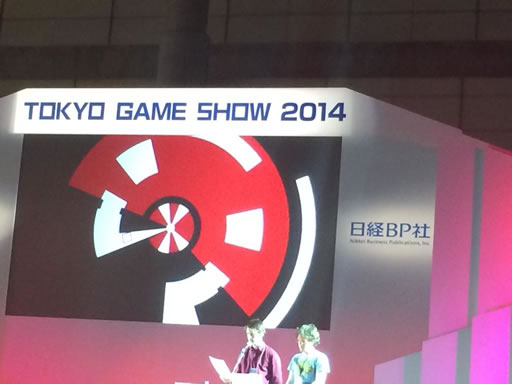
Image from Tabata Hideki- Twitter
Thoughts for TGS 2015 Exhibitors
I think I’m nearing the end of everything I’m wanting to say. I thought I’d finish off with some advice/thoughts for those who are considering exhibiting at Tokyo Game Show next year.
Translation
If your game needs an explanation in order to play then you will most definitely want to translate at the least the instructions in your game. Expand is quite simple to get started with and so we didn’t perform any translation, other teams did.
There are volunteer translators around during the event but they’re not going to be able to explain your game to everyone. They are there more for general assistance and may not available when you need them.
If you have promotional material with a lot of text then you should also consider getting that translated as well.
Arrive Early just to be safe
Especially on the public days you want to arrive a bit earlier than expected for setup. Several developers were arriving after the venue opened because they didn’t expect the number of people on public transport. On the first business day it took me over half an hour to find out where the entrance was for exhibitors and where I could get the exhibitor passes. If you don’t know the Japanese language then you should be giving yourself extra time.
Learn a bit of Japanese
You don’t need to know much. Simple phrases will do. I wish I picked up some more.
If you get the chance travel
Japan is an amazing place. If you can set aside a few days or even a few weeks to travel before or afterwards then that’s a good idea. We set aside about 5 days afterwards and it definitely didn’t feel like enough.
Attend the Tokyo/Kyoto Indie Events if they are on
We were lucky to find out that a casual indie meetup event called Tokyo Indies was being held at the Monday after TGS. There is another gathering held in Kyoto as well. Both of these are monthly and worth going to if you’re still in Japan.
Get yourself a pocket wifi internet device
These things are fantastic and really useful. It was handy to just check Twitter in between manning the booth. They’re also pretty well priced. I picked mine up at the airport at the post office and then dropped it back into the post(with the provided envelope) when returning to the airport. For reference this is the company that I ordered mine through.
That’s pretty much all that I have to say. Hopefully someone finds what I’ve said useful. If you have any questions feel free to get in touch.

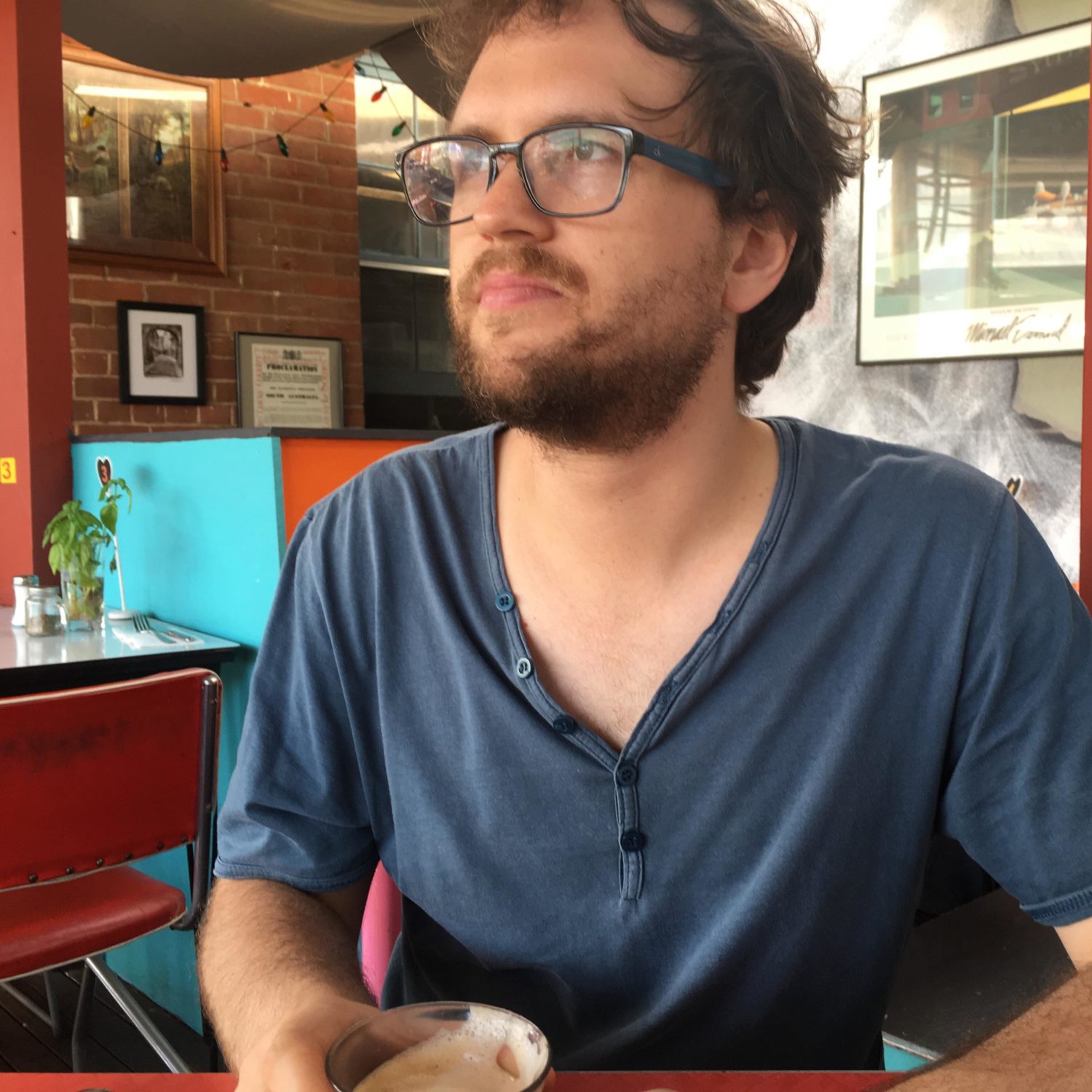
Thanks for sharing your experiences at TGS. Do you think it would’ve been worth it to take the trip if you weren’t exhibiting your game?
If we weren’t exhibiting the game but still attended the parties, explored TGS and presented at Sense of Wonder Night then I think the trip would have been barely justified. For us exhibiting at TGS was one of the major reasons we went. We wouldn’t have met half the amazing people we did if we weren’t exhibiting.
If you were looking to just meet people and make contacts then going to say GDC would be a much better choice. Not that I’ve been to GDC that’s just my impressions from friends.
With all that said, Japan is such as an amazing place. If you want to travel and explore the world then it’s definitely worth going to at least once. For us this trip was a ‘business’ trip. We’ll definitely be going back again as tourists.